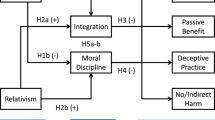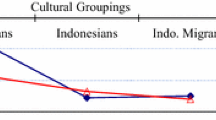Abstract
This article presents the results of a cross-cultural study that examines the relationship between spirituality and a consumer’s ethical predisposition, and further examines the relationship between the internalization of one’s moral identity and a consumer’s ethical predisposition. Finally, the moderating impact of cultural factors on the above relationships is tested using Hofstede’s five dimensions. Data were gathered from young adult, well-educated consumers in five different countries, namely the U.S., France, Spain, India, and Egypt. The results indicate that the more spiritual an individual consumer is, the more likely that consumer is to be ethically predisposed. Furthermore, the stronger one’s internalization of a moral identity, the more likely one is to be ethically predisposed. These two relationships are further moderated by Hofstede’s cultural factors such as the degree of collectivism versus individualism in the culture. However, the strength and direction of the moderation may vary depending upon the specific Hofstede dimension.

Similar content being viewed by others
References
Allport, G. W. (1950). The individual and his religion: A psychological interpretation. New York: MacMillan.
Allport, G. W., & Ross, J. M. (1967). Personal religious orientation and prejudice. Journal of Personality and Social Psychology, 5, 432–443.
Aquino, K., & Reed, A, I. I. (2002). The self importance of moral identity. Journal of Personality and Social Psychology, 83(6), 1423–1440.
Auger, P., Devinney, T. M., & Louviere, J. J. (2004). Consumer Social Beliefs: An International Investigation Using Best-Worst Scaling Methodology, unpublished working paper.
Bergman, R. (2004). Caring for the ethical ideal: Nel noddings on moral education. Journal of Moral Education, 33(2), 149–162.
Brockner, J., Ackerman, G., Greenberg, J., Gelfand, M. J., Francesco, A. M., Chen, Z. X., et al. (2001). Culture and procedural justice: The influence of power distance on reactions to voice. Journal of Experimental Social Psychology, 37(4), 300–315.
Davis, R. (1979). Comparison of consumer acceptance of rights and responsibilities. In N. M. Ackerman (Ed.), Proceedings of the 25th Annual Conference of the American Council on Consumer Interests (pp. 68–70). American Council on Consumer Interests.
Detert, J. R., Trevino, J. K., & Sweitzer, V. L. (2008). Moral Disengagement in ethical decision making: A study of antecedents and outcomes. Journal of Applied Psychology, 93(2), 374–391.
Donahue, M. J. (1985). Intrinsic and extrinsic religiousness: Review and meta-analysis. Journal of Personality and Social Psychology, 48(2), 400–419.
Emmons, R. A. (1999). The psychology of ultimate concerns: Motivation and spirituality in personality. New York: The Guilford Press.
Geyer, A. L., & Baumeister, R. F. (2005). Religion, morality, and self-control. In R. F. Paloutzian & C. L. Park (Eds.), The handbook of religion and spirituality (pp. 412–432). New York: The Guilford Press.
Goldberg, J. R. (2006). Spirituality, religion and secular values: What role in psychotherapy. Family Therapy News, 25, 16–17.
Hardy, S. A. (2006). Identity, reasoning, and emotion: An empirical comparison of three sources of moral motivation. Motivation and Emotion, 30(3), 207–215.
Hayes, A. F. (2013). Introduction to mediation, moderation, and conditional process analysis. New York: Guilford Press.
Hofstede, G. (1980). Motivation, leadership, and organization: Do American theories apply abroad? Organizational Dynamics, 9(1), 42–63.
Hofstede, G. (1983). National cultures in four dimensions: A research-based theory of cultural differences among nations. International Studies of Management & Organization, 13(2), 46–74.
Hofstede, G. (1984). Culture’s consequences: International differences in work-related values (Abridged ed.). Beverly Hills: Sage.
Hofstede, G. (1985). The interaction between national and organizational value systems. Journal of Management Studies, 22(4), 347–357.
Hofstede, G. (1991). Cultures and organizations: Software of the mind, Berkshire. McGraw-Hill Book Company (UK) Limited: England.
Hofstede, G., Hofstede, G. J., & Minkov, M. (2010). Cultures and organizations: Software of the mind. Revised and Expanded 3rd ed. New York: McGraw-Hill.
Huffman, T. E. (1988). In the world but not of the world: Religious, alienation, and philosophy of human nature among Bible College and Liberal Arts College Students, dissertation. Ames, IA: Iowa State University.
Hunt, S. D., & Vitell, S. J. (1986). A general theory of marketing ethics. Journal of Macromarketing, 8(2), 5–16.
Hunt, S. D., & Vitell, S. J. (1993). The general theory of marketing ethics: A retrospective and revision. In N. C. Smith & J. A. Quelch (Eds.), Ethics in marketing (pp. 775–784). Homewood, IL: Irwin Inc.
Jones, T. M. (1991). Ethical decision making by individuals in organizations: An issue-contingent model. Academy of Management Review, 16(2), 366–395.
Kluckhohn, F. R., & Strodtbeck, F. L. (1961). Variations in value orientations. Westport, CT: Greenwood Press.
Light, D., Keller, S., & Calhoun, C. (1989). Sociology. New York: Alfred A. Knopf.
Muncy, J. A., & Vitell, S. J. (1992). Consumer ethics: An investigation of the ethical beliefs of the final consumer. Journal of Business Research, 24(3), 297–311.
Nakata, C., & Sivakumar, K. (1996). National culture and new product development: An integrative review. Journal of Marketing, 60(1), 61–72.
Parsons, T., & Shils, E. A. (1951). Toward a general theory of action. Cambridge, MA: Cambridge University Press.
Polonsky, M. J., Brito, P. Q., Pinto, J., & Higgs-Kleyn, N. (2001). Consumer ethics in the European Union: A comparison of northern and southern views. Journal of Business Ethics, 31(2), 117–130.
Rawwas, M. Y. A., Vitell, S. J., & Al-Khatib, J. (1994). Consumer ethics: The possible effects of terrorism and civil unrest on the ethical values of consumers. Journal of Business Ethics, 13(3), 223–231.
Rawwas, M. Y. A., Ziad, S., & Mine, O. (2005). Consumer ethics: A cross-cultural study of the ethical beliefs of Turkish and American consumers. Journal of Business Ethics, 57(2), 183–195.
Reed, A., Aquino, K., & Levy, E. (2007). Moral identity and judgments of charitable behaviors. Journal of Marketing, 71(1), 178–193.
Ryan, K., & Fiorito, B. (2003). Means-ends spirituality questionnaire: Reliability, validity and relationship to psychological well-being. Review of Religious Research, 45(2), 130–154.
Schwartz, S. H. (1994). Beyond individualism/collectivism: New cultural dimensions of values. London: Sage Publications Inc.
Shao, R., Aquino, Karl, & Freeman, D. (2008). Beyond moral reasoning: A review of moral identity research and its implications for business ethics. Business Ethics Quarterly, 18(4), 513–540.
Tata, J. (2005). The influence of national culture on the perceived fairness of grading procedures: A comparison of the United States and China. The Journal of psychology, 139(5), 401–412.
Tompenaars, F., & Hampden-Turner, C. (1998). Riding the waves of culture: Understanding cultural diversity in business. London: Nicholas Brealey Publishing.
Torelli, C. J., & Shavitt, S. (2010). Culture and concepts of power. Journal of Personality and Social Psychology, 99(4), 703–723.
Trevino, L. K., Weaver, G. R., & Reynolds, J. S. (2006). Behavioral ethics in organizations: A review. Journal of Management, 32(6), 951–990.
Triandis, H. C. (1995). Individualism and collectivism. Boulder, CO: Westview Press Inc.
Vitell, S. J. (2009). The role of religiosity in business and consumer ethics: A review of the literature. Journal of Business Ethics, 90(Suppl 2), 155–167.
Vitell, S. J., Bing, M. N., Davison, H. K., Ammeter, T. P., Garner, B. L., & Novicevic, M. M. (2009). Religiosity and moral identity: The mediating role of self-control. Journal of Business Ethics, 88(4), 601–613.
Vitell, S. J., Keith, M., & Mathura, M. (2011). Antecedents to the justification of norm violating behavior among business practitioners. Journal of Business Ethics, 101(1), 163–173.
Vitell, S. J., & Muncy, J. (1992). Consumer ethics: An empirical investigation of factors influencing ethical judgments of the final consumer. Journal of Business Ethics, 11(9), 585–597.
Vitell, S. J., & Muncy, J. (2005). The Muncy–Vitell consumer ethics scale: A modification and application. Journal of Business Ethics, 62(3), 267–275.
Vitell, S. J., & Paolillo, J. G. (2003). Consumer ethics: The role of religiosity. Journal of Business Ethics, 46(2), 151–162.
Vitell, S. J., Paolillo, J. G., & Singh, J. J. (2005). Religiosity and consumer ethics. Journal of Business Ethics, 57(2), 175–181.
Walker, L. J., & Pitts, R. C. (1998). Naturalistic conceptions of moral maturity. Developmental Psychology, 34(3), 403–419.
Weaver, G. R. (2006). Virtue in organizations: Moral identity as a foundation for moral agency. Organization Studies, 27(3), 341–368.
Wilkes, R. E. (1978). Fraudulent behavior by consumers. Journal of Marketing, 41(4), 67–75.
De Paulo, P. J. (1987). Ethical perceptions of deceptive bargaining tactics used by salespersons and customers: A double standard. In J. G. Sagert (Ed.), Proceedings of the Division of Consumer Psychology (pp. 201–203). Washington, D.C.: American Psychological Association.
Author information
Authors and Affiliations
Corresponding author
Rights and permissions
About this article
Cite this article
Vitell, S.J., King, R.A., Howie, K. et al. Spirituality, Moral Identity, and Consumer Ethics: A Multi-cultural Study. J Bus Ethics 139, 147–160 (2016). https://doi.org/10.1007/s10551-015-2626-0
Received:
Accepted:
Published:
Issue Date:
DOI: https://doi.org/10.1007/s10551-015-2626-0




